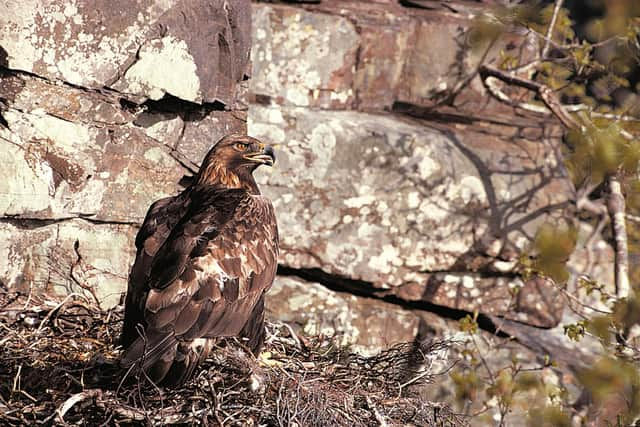The eagles have landed – and hatched chicks – in Orkney after 40-year absence
It has been confirmed that a pair of golden eagles have successfully hatched chicks at a nest at a nature reserve on the island of Hoy, the first in the region since 1982.
The new arrivals were spotted by RSPB Scotland wardens working at the site but it’s not yet known how many are in the nest.
Advertisement
Hide AdAdvertisement
Hide AdSince golden eagles are very sensitive to disturbance, the location of the nest is not being disclosed.


But the local team is keeping a watchful eye on the new family – from a distance – to monitor their progress and see how many youngsters emerge when it’s time to practise their flight skills.
The species typically raises one or two chicks at a time, so conservationists are excitedly waiting to see how many chicks might fledge from the Hoy nest.
Lee Shields, RSPB Scotland’s Hoy warden, said: “It is wonderful to see these magnificent eagles return to Orkney and we’re delighted that they are nesting in Hoy.


“Golden eagles are one of the most iconic birds in Scotland and they have been missing here for too long.
“We want to give these birds the best chance of success, which is why it’s so important to not reveal where the nest is.
“It is an inspiring sight to see the male and female soaring over the Hoy hills, and we’re eagerly awaiting finding out how many chicks they have.”
Golden eagles are one of Scotland’s largest birds of prey – second only in size to the white-tailed eagle, also known as the sea eagle, dubbed the ‘flying barn door’ – and won a vote to be named the country’s national bird.
Advertisement
Hide AdAdvertisement
Hide AdThe species was once a common sight across Orkney but persecution by humans meant just a single pair remained by 1848.
It took more than a century, 116 years, before golden eagles once again bred in Orkney – on Hoy in 1966.
That lone pair had a long and successful partnership, raising many chicks together until one of the adult birds died in the winter of 1982.
Since the species mates for life, the surviving eagle continued to return to Hoy for a further three years but there were no further nesting attempts.
Ms Shields added: “This golden eagle pair are at an early stage of their breeding life and as they are long-lived birds we hope not only that they will be as successful as their predecessors, but that they are the beginning of this species re-establishing itself in Orkney.
“These birds are an integral part of Orkney’s history, and with this pair and their young we’re keeping our fingers crossed we can look forward to them being part of its future once again.”
The cliffy island, home to the towering Old Man of Hoy sea stack, is a hotspot for birdlife, including threatened seabirds and other birds of prey.
The first white-tailed eagle chicks to hatch in Orkney for more than 140 years were also born on Hoy, back in 2018.
Advertisement
Hide AdAdvertisement
Hide AdAll of the UK’s breeding golden eagles are found in Scotland, with the most recent national survey putting numbers at 508 pairs.
